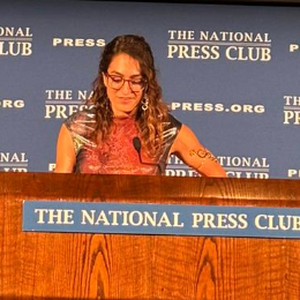I'm an award-winning investigative reporter at NPR, based in D.C.

My investigative reporting for NPR has led to congressional action and policy change, and has been honored with multiple national awards. In 2025, my continued coverage of the death penalty won first place and best in show in the National Headliner's Award broadcasting competition. The National Press Club awarded my reporting with first place in both print and broadcasting competitions in 2025 and 2024.
The work has been well-received by listeners and readers like you. My scoop that revealed that sensitive information was found on hotel printers in Alaska before the 2025 Putin-Trump summit was NPR's most popular story thus far in 2025. The examination I published of the biomedical horseshoe crab harvest for pharmaceutical use was NPR's third most read digital story in 2023.
At NPR, I've also revealed never-before-heard audio tapes recorded behind the scenes during executions, exposed the lack of protections for critically endangered whales in the Gulf of Mexico and quickly published investigations after the Francis Scott Key Bridge collapsed in Baltimore, Maryland and a train carrying hazardous chemicals derailed in East Palestine, Ohio.
Before working in D.C., I was an investigative reporter at The State in South Carolina, where I covered everything from education disparities affecting immigrants to the toll of execution work. My reporting on executioners and the state's preparations for the firing squad, featured by Nieman here, was honored with the McClatchy President’s award for the best reporting in the McClatchy network in 2021 and recognized with an Investigative Reporters and Editors (IRE) Finalist nod.
My formal training is in public health and my freelance work has often highlighted little-known healthcare stories.
My reporting for WIRED revealed how a biomedical company kept selling the "brain health" dietary supplement called Prevagen to the elderly, despite the fact that the FDA knew it was hazardous and linked to reports of seizures and strokes. The coverage led to ongoing efforts to close loopholes in federal food safety regulation.
For The Marshall Project, using data from a national questionnaire that I designed, I exposed how life in prison and consequences after release can be worse for people with developmental disabilities. For Scientific American, I covered rogue methane leaks — poorly regulated by the EPA and harming the health of poor people of color living nearby. For The Boston Globe, I reported on disparities in treatment for doctors recovering from addiction.
I speak Spanish and Portuguese and am Argentine-American. My reporting has often taken me overseas.
I covered science and technology for The Economist in London — my first job in journalism. Later, for The Guardian and The Intercept, I revealed how one of Honduras’ most prominent environmental activists was assassinated, with help from a man who was trained at West Point. I reported on Arctic animals for Scientific American from Norway, and during the 2019 Argentine presidential elections, reported in Spanish for Clarín, one of Argentina's two major newspapers based in Buenos Aires.
I received a Bachelor of Science from the University of Texas at Austin and a Master of Science from the Columbia University Graduate School of Journalism / Stabile Center for Investigative Journalism.